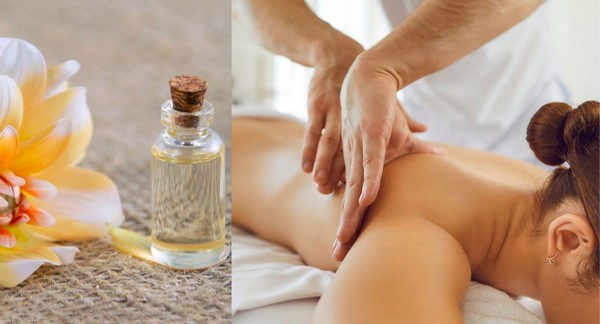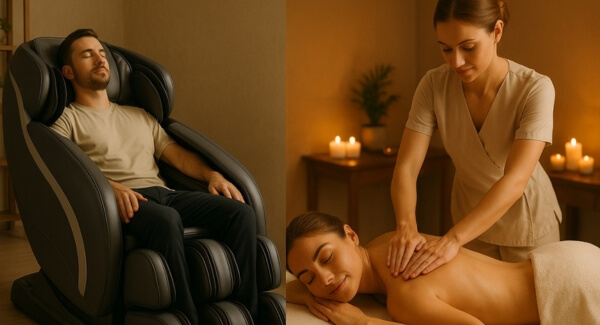What Types Of Oils Are Used In Massage Therapy? Review

Massage therapy commonly uses various oils to facilitate smooth and gliding movements during the massage session. These oils reduce friction between the therapist's hands and the client's skin, offering additional benefits such as moisturising the skin and providing a pleasant aroma.
Some massage therapists may prefer other oils based on their own experiences and the specific requirements of their clients. If you have any particular concerns or allergies, contact your massage therapist to ensure they select the right oil for your massage session. Here are some commonly used oils in massage therapy:
Coconut Oil - this oil is known for its nourishing properties and pleasant tropical scent. Coconut oil is a popular choice for massage therapy due to its unique properties and benefits. It has a smooth and creamy texture, allowing easy application and gliding over the skin during massage.
Coconut oil helps to hydrate and nourish the skin, leaving it soft and supple, which can be particularly beneficial for individuals with dry skin. Its tropical scent can add to the overall relaxation and provide a pleasant and luxurious feel to the massage experience. It is generally well-tolerated and gentle on the skin, making it suitable for individuals with sensitive skin or those prone to allergic reactions.
It's always advisable to perform a patch test beforehand. It is worth noting that coconut oil can solidify at cooler temperatures, so it may need to be warmed before use.
Olive Oil – this oil contains high levels of essential fatty acids, alpha-linolenic acid, antioxidants, vitamins A and E, and when applied externally, it calms the sore and inflamed skin. Olive oil can be used as a remedy for arthritis when rubbed regularly on the affected parts.
Olive oil massage improves blood circulation and hydrates, moisturises, and smoothens skin, helps in reducing stretch marks, and slows skin ageing by maintaining skin elasticity and firmness.
Grapeseed Oil – this oil contains a high concentration of beneficial compounds, including antioxidants, vitamins (such as vitamin E), and fatty acids. These properties can help nourish and moisturise the skin, promoting overall health. Grapeseed oil is light and easily absorbed, making it suitable for most skin types.
Grapeseed Oil has a neutral scent and contains antioxidants that can benefit the skin. It has a light and silky texture, making it easy to spread and absorb into the skin. It doesn't leave a heavy or greasy feeling after the massage, allowing for a comfortable experience.
Due to its low comedogenic rating,Grapeseed oil suits acne-prone skin. It is less likely to clog pores and cause breakouts, making it suitable for acne-prone or sensitive skin.
Typically odourless or very mild scent, Grapeseed oil is a good choice for individuals who prefer unscented or subtly scented massage oils. It can be easily combined with essential oils to add a pleasant aroma to the treatment.
Sweet Almond Oil - the most commonly used oil in massage therapy is sweet almond oil due to its excellent properties for massage, including its mild scent and smooth texture. This oil is one of the most used carrier oils in aromatherapy massage, and this is understandable as it has a fine texture, which helps to leave the skin soft and satiny smooth, yet it is non-greasy.
Almond oil is lubricating but not penetrating oil, which makes it excellent protection and highly used in massage therapy. Sweet almond oil is widely used in cosmetics and body products for its rich properties such as Vitamin A, B1, B6, D, linoleic acid and minerals. Sweet almond oil is especially suited for dry, sensitive and irritated skin. It is softening, nourishing and revitalising to the skin.

Apricot Kernel Oil - Apricot kernel oil is a light and moisturising oil that is suitable for sensitive skin. It is rich in vitamins and minerals and has a subtle nutty aroma.
Sunflower Oil - Sunflower oil is popular oil used in massage therapy. It has a light texture and is rich in essential fatty acids, vitamins, and antioxidants, which can help nourish and moisturise the skin.
Jojoba Oil - Jojoba oil closely resembles the natural sebum produced by the skin, making it an excellent choice for massage. It is lightweight, non-greasy, and easily absorbed. Jojoba oil is suitable for all skin types and does not clog pores.
Sweet Orange Essential Oil - is fantastic for so many reasons. It has a lovely, sweet smell and warm, happy feelings. When used in aromatherapy, it is calming for the digestive system and can help with colds and flu. When added to a massage, carrier oil is great for the skin.
Lavender Essential Oil - has a calming aroma, which makes it an excellent nerve tonic. It aids in treating migraines, headaches, anxiety, depression, nervous tension and emotional stress. A regular massage with Lavender essential oil provides relief from pain.
Popular Massage Oils & Health Benefits
| Oil Name | Base Oil | Essential Oils | Purpose |
|---|---|---|---|
| Coconut Oil | Coconut Oil | None | Moisturizing, Nourishing |
| Olive Oil | Olive Oil | None | Hydrating, Antioxidant |
| Grapeseed Oil | Grapeseed Oil | None | Lightweight, Non-Greasy |
| Sweet Almond Oil | Sweet Almond Oil | None | Moisturizing, Soothing |
| Apricot Kernel Oil | Apricot Kernel Oil | None | Nourishing, Softening |
| Sunflower Oil | Sunflower Oil | None | Hydrating, Conditioning |
| Jojoba Oil | Jojoba Oil | None | Hydrating, Balancing |
| Sweet Orange Essential Oil | Not applicable | Sweet Orange Essential Oil | Uplifting, Refreshing |
| Lavender Essential Oil | Not applicable | Lavender Essential Oil | Relaxing, Calming |
Ingredients to Avoid in Massage Oils
While selecting beneficial ingredients is crucial, it's equally important to steer clear of potentially harmful or irritating substances. Here are some ingredients to avoid when formulating massage oils:
Artificial Fragrances and Colours
Artificial fragrances and colours are commonly used in commercial massage oils to enhance their aesthetic appeal and create a pleasant sensory experience. However, these synthetic additives can adversely affect clients' skin and well-being.
Fragrances derived from synthetic chemicals may contain irritants and allergens that can cause skin irritation, redness, and discomfort, particularly in individuals with sensitive skin or allergies. Similarly, artificial colours used to tint massage oils may contain dyes and chemicals that can further exacerbate skin reactions.
For massage therapists committed to providing safe and therapeutic experiences, opting for natural and unscented oils or those scented with pure essential oils is paramount. Natural oils, such as almonds, jojoba, or coconut oil, offer nourishing properties for the skin without the risk of irritation associated with artificial fragrances and colours.
Additionally, pure essential oils from plant sources impart delightful scents and provide therapeutic benefits, such as relaxation, pain relief, and mood enhancement. By prioritising natural alternatives over synthetic additives, massage therapists can ensure a safer and more enjoyable experience for their clients, promoting skin health and overall well-being.
Mineral Oil
Mineral oil, a petroleum derivative, is a common ingredient in many commercial massage oils. While it is an effective lubricant, mineral oil has potential drawbacks that may compromise its suitability for massage therapy. One concern is its tendency to clog pores, leading to skin congestion and discomfort, particularly for clients with oily or acne-prone skin.
Unlike plant-based oils such as almond or jojoba, which are lightweight and easily absorbed, mineral oil forms a barrier on the skin's surface, potentially hindering the skin's natural functions and impeding moisture absorption.
Furthermore, mineral oil may not offer the same skin-nourishing benefits as natural oils derived from plant sources. Almond oil, for instance, is rich in vitamins and antioxidants that promote skin health and hydration, while jojoba oil closely resembles the skin's natural sebum, making it an excellent moisturiser.
By choosing massage oils from natural sources rather than mineral oil, massage therapists can provide clients with healthier alternatives that lubricate the skin effectively and nourish and rejuvenate it, contributing to a more holistic and beneficial massage experience.
Parabens
Parabens are widely employed as preservatives in various cosmetics and skincare products, including massage oils, to prolong their shelf life and prevent microbial growth. However, the use of parabens has sparked apprehension due to potential health risks associated with their prolonged exposure.
Of particular concern is their suspected ability to disrupt the hormonal balance by mimicking estrogen, a key hormone in the body's endocrine system. Research has suggested that parabens may interfere with hormone function, leading to hormonal imbalances and associated health issues.
Given the uncertainties surrounding the long-term effects of paraben exposure, massage therapists should prioritise the safety and well-being of their clients by opting for paraben-free alternatives. Fortunately, numerous paraben-free options are available on the market, formulated with alternative preservatives or natural preservation methods.
By choosing paraben-free massage oils, therapists can provide clients peace of mind, minimising potential risks and ensuring a safer and more health-conscious massage experience.
Propylene Glycol
Propylene glycol is a synthetic compound commonly used as a humectant and solvent in various skincare products, including massage oils. While it is an effective carrier for active ingredients and helps maintain product consistency, propylene glycol has been associated with skin irritation, particularly in individuals with sensitive or reactive skin.
This compound has a low molecular weight, allowing it to penetrate the skin quickly, but this same property can also make it more likely to cause irritation or allergic reactions.
For massage therapists concerned about their clients' skin sensitivities, it's advisable to steer clear of massage oils containing propylene glycol. Clients with reactive skin may be more prone to experiencing discomfort or adverse reactions when exposed to this synthetic compound, potentially undermining the therapeutic benefits of the massage session.
Instead, therapists can opt for propylene glycol-free alternatives, such as oils formulated with natural emollients and moisturisers, to ensure a gentler and more soothing experience for their clients.
By prioritising propylene glycol-free massage oils, therapists can minimise the risk of skin irritation and create a safer and more enjoyable environment for their clients' relaxation and well-being.
Allergenic Essential Oils
While essential oils are celebrated for their therapeutic properties and aromatic benefits, it's crucial to acknowledge that certain oils may pose risks for individuals with allergies or sensitivities. Some essential oils, such as nutmeg, cinnamon, and certain citrus oils, contain compounds that can trigger allergic reactions in susceptible individuals.
These reactions can manifest as skin irritation, respiratory discomfort, or even severe allergic responses in rare cases. Therefore, massage therapists must exercise caution and diligence when selecting and using essential oils, especially in blends intended for clients with unknown sensitivities.
Massage therapists should always inquire about their clients' allergies and sensitivities before incorporating essential oil blends into massage sessions. By gathering relevant information about potential allergens, therapists can tailor their oil selections to mitigate risks and ensure a safe and comfortable experience for clients.
In cases where clients have known allergies to specific essential oils, therapists can explore alternative options or opt for unscented massage oils to avoid potential allergen exposure. Proactive communication and allergen awareness are essential for promoting client safety and well-being in massage therapy settings.
Final Notes
By being mindful of these ingredients to avoid, massage therapists can create safer and more enjoyable experiences for their clients. By understanding the properties and benefits of various oils and incorporating scientific evidence into practice, you can offer tailored and evidence-based care to clients, ensuring their pain relief and relaxation.
Remember that each client is unique, and their preferences and sensitivities should guide the choice of massage oil. By combining expertise with the right selection of ingredients, massage therapists can deliver truly therapeutic experiences that promote health and well-being.
Summary of the Most Commonly Used Oils in Massage Therapy
Apart from these oils, massage therapists may also use blended oils that combine different carrier oils with essential oils for aromatherapy massage. Essential oils are highly concentrated extracts from plants and can provide additional therapeutic benefits such as relaxation, stress reduction, or pain relief.
It's important to note that essential oils should be used cautiously and properly diluted to avoid skin irritation or allergic reactions. You should consult a trained aroma therapist or massage therapist with expertise in using essential oils.
It's important to note that the choice of oil used in massage therapy can vary among therapists and may depend on personal preference, client's needs, allergies, and specific therapeutic goals.
Massage Today lists three-step checklist that can help you find essential oils you can trust. Let your massage therapist know your preferences and any specific concerns or allergies, who can select an appropriate oil that suits your needs and ensure a safe and comfortable experience.
Author – Martha Anderson - a creative writer, blogger, and expert in massage therapy, holistic wellness, nutrition, and personal training. She has a passion for helping individuals achieve optimal health and well-being. Martha holds advanced sports science and nutrition degrees and is committed to evidence-based practices. Her work emphasises understanding the intricate connections between physical health and mental wellness.
Search Massage Therapists Near You.
More From Our Blog
Latest Blogs
UK Massage Industry Booming in 2026: 11% of UK Adults Now Use Massage Therapy (UK Report 2025)
Post-Thai Massage Care: Tips for Maximizing the Benefits After Your Session
Thai Massage for Beginners: Answering Common Questions for Your First Session
Choosing the Right Thai Massage Therapist: What to Look for in a Qualified Professional
Post-Thai Massage Care: Tips for Maximising the Benefits After Your Session
Preparing for Your Thai Massage: Tips on What to Wear and How to Get Ready
How to Talk to Your Therapist for the Best Thai Massage Experience
What to Expect During a Traditional Thai Massage Session
A Guide to How Thai Massage Techniques Can Correct Postural Issues
How Thai Massage Can Help with Back Pain, Headaches, and Sciatica
View All Blogs
Advertise with Massages Me and Grow Your Business!
We are the leading massage platform for massage therapists in London and across the UK covering all of England, Scotland, Wales and Northern Ireland. Our aim is to promote individual therapists and venues in the UK, and help professional and casual body workers providing therapeutic and relaxing massages to expand their businesses and build desirable client base.
We provide a friendly and reliable online advertising platform for qualified Masseuses, students, and salons to connect with potential clients looking for relaxing and therapeutic massages - onsite and offsite mobile services across the UK.
Are you looking to meet more customers? Get your profile listed and start getting bookings today!



